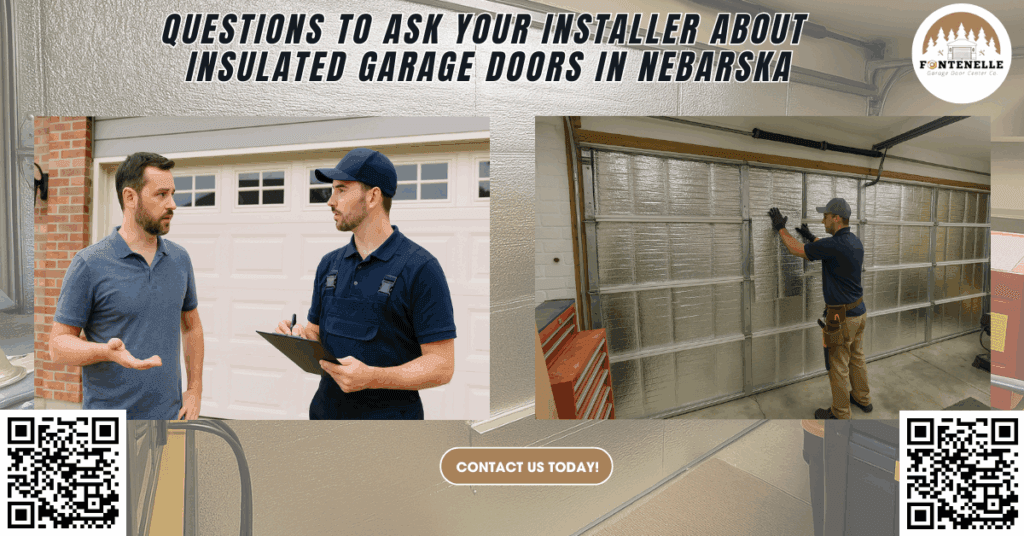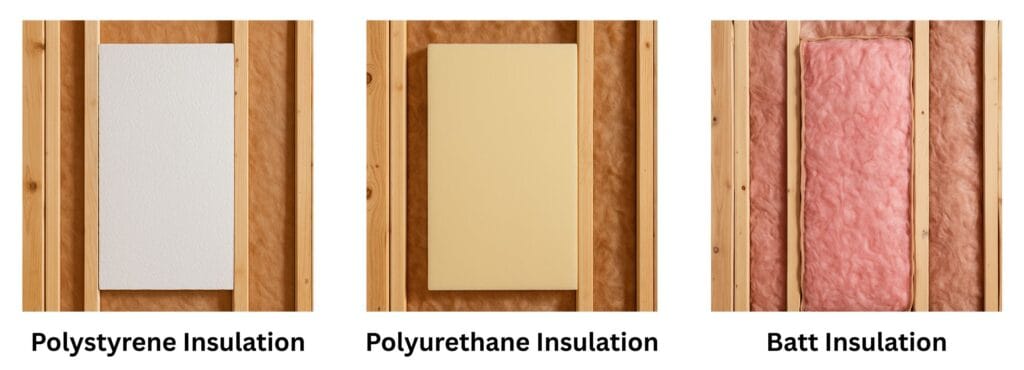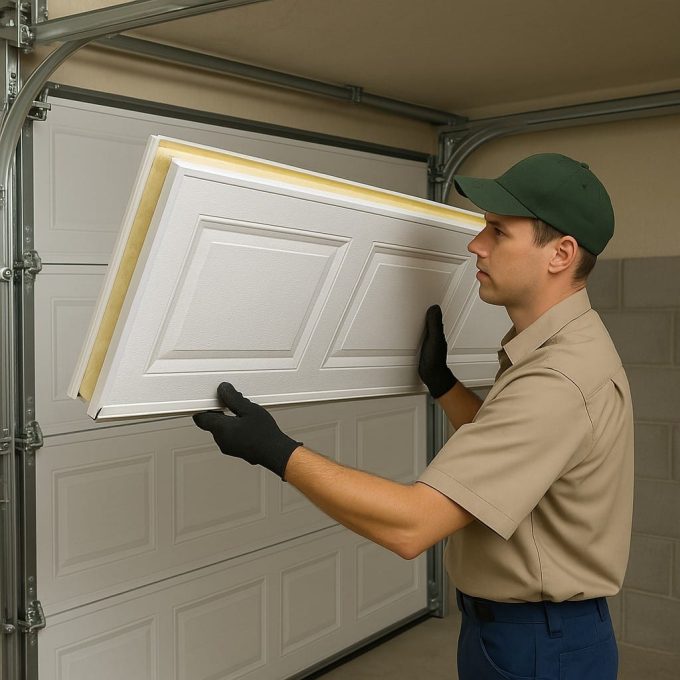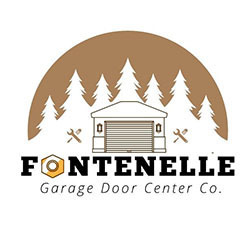Questions to Ask Your Installer About Insulated Garage Doors in Nebraska

The Cold Truth: A Local Story Worth Sharing
In the heart of a frigid Nebraska winter, a Bellevue family contacted us with a serious problem. Their garage, which doubled as a workshop and extra storage space, was unbearably cold. They had a traditional steel door without insulation. Their energy bills skyrocketed, and everything from tools to paint froze. After switching to a high-quality insulated garage door, they saw a dramatic drop in heating costs and regained full use of their garage space, even in freezing temperatures.
That story is more common than you might think. According to energy efficiency experts, garage doors are one of the largest uninsulated surfaces in a home, and upgrading to insulated garage doors can significantly improve energy savings, especially in climate zones like Nebraska. Whether you’re trying to protect your car, reduce heat loss, or convert your garage into usable space, the right insulation can make a world of difference.
At Fontenelle Garage Door Center Co., we’ve helped countless families and businesses in Bellevue, NE, install insulated garage doors that are built to withstand Nebraska’s extreme weather, be it blistering summer heat or bone-chilling winters. Asking the right questions can ensure you get the right door, insulation type, and long-term value.
Why Is Insulation Important for Garage Doors?
Insulated garage doors offer more than just comfort; they provide thermal resistance, energy efficiency, soundproofing, and even enhanced durability. In Nebraska’s fluctuating climate, a garage door acts as both a shield and a barrier against the elements.
Key Benefits of Insulated Garage Doors:
- Energy Efficiency: Thick insulation such as polyurethane or polystyrene significantly reduces heat transfer. This lowers your energy bills and helps maintain stable indoor temperature in connected rooms and garage spaces.
- Thermal Transfer Prevention: Reduces heat loss in winter and keeps your garage cooler in summer, making your home more comfortable year-round.
- Durability and Strength: Multi-layer steel, fiberglass, or aluminum doors with insulation resist dents, rust, and impact better than non-insulated doors.
- Noise Reduction: Insulated garage doors dampen outside noise and create a quieter operation, ideal for residential garages and home workshops.
- Protection for Stored Items: Insulated doors prevent freezing or overheating of tools, electronics, liquids, and even vehicles.
Choosing the right insulation material, R-value, and garage door type is essential to get the most out of your investment.
Questions to Ask Your Garage Door Installer
1. What Type of Insulation Is Used in This Door?
Not all insulation materials are equal. Your installer should explain whether the garage door uses:
- Polystyrene: Lightweight foam panels are placed inside the garage door. It’s cost-effective and available in many basic door models.
- Polyurethane: A high-density foam that’s injected into the door structure. This provides better insulating performance, higher R-values, and better soundproofing.
- Batt Insulation or Rigid Foam Panels: Sometimes used in insulation kits for DIY upgrades.

A trusted installer will guide you through these options based on your climate, budget, and intended garage use.
2. What Is the R-value of the Garage Door?
R-value measures a material’s resistance to heat flow; the higher the number, the better the insulation.
- For Nebraska homes, an R-value of R-10 to R-16 is ideal.
- If your garage is attached to your home or heated, choose a higher rating for thermal efficiency.
- For detached or rarely-used garages, lower R-values may be sufficient.
Ask your installer to compare R-values and U-values (the inverse measure of heat transfer) for different models, such as sectional doors, single doors, or insulated garage door kits.
3. How Will This Insulated Garage Door Affect My Energy Bills?
Garage doors cover a large area and are subject to frequent use. This makes them a key factor in your home’s overall energy efficiency.
- Insulated garage doors reduce energy loss, especially in attached garages.
- They lower heating and cooling demands on your HVAC system, which reduces energy bills year-round.
- Ask your installer for an estimated return on investment based on your specific garage space, door size, and garage door opener system.
4. Can You Show Me the Difference Between Insulated and Non-Insulated Doors?
Seeing is believing. Ask to physically examine:
- Non-insulated garage doors: Often single-layer steel or aluminum, hollow, noisy, and prone to dents.
- Insulated doors: Thicker, multi-layer constructions with foam, urethane, or fiberglass core materials, reducing thermal transfer and noise.
Ask to compare styles such as craftsman garage doors, chamberlain garage doors, or premium brands like Clopay, Amarr, or Martin Garage Doors.
5. What Is the Warranty on the Insulated Garage Door?
Warranties reflect product quality and installer confidence.
- Look for warranties that cover panels, springs, garage door openers, and insulation performance.
- Ask about coverage for weather damage, corrosion, and faulty logic boards in smart garage openers.
- Ensure both product and labor are included.
6. Will the Door Match My Home’s Style?
Your garage door is one of the most visible parts of your home exterior.
- Ask for color options, decorative panels, windows, and custom hardware.
- See samples from door lines like Clopay, Martin, or Amarr.
- Consider styles that blend with your siding, roofline, and entry doors.
7. Is This Door Rated for Nebraska’s Extreme Weather?
With winters that dip below zero and hot summers, Nebraska demands doors that are:
- Weather-resistant: Sealed against moisture, snow, and high winds.
- UV-resistant: Especially for aluminum doors that face strong sun exposure.
- Rust-proof: Choose corrosion-resistant steel, fiberglass, or coated aluminum for longevity.
8. How Long Will the Installation Take?
Most garage door installations take 4–6 hours, depending on:
- Door type: Single door, double door, or sectional doors
- Complexity of installation: Replacing hardware, adding insulation, or upgrading the garage door opener
- Ask if old doors and insulation debris will be hauled away

9. Will You Install Weather Seals and Thresholds?
Your door’s insulation performance also depends on weatherproofing.
- Ask for installation of bottom rubber seals, side seals, and top weatherstrips
- Threshold seals help prevent water, dust, and insects from entering your garage
- A proper seal also reduces temperature transfer and improves noise reduction
10. What Maintenance Will the Door Need?
Ask your installer about long-term care routines:
- Seasonal checks on rollers, hinges, and garage door opener logic boards
- Lubrication of springs and tracks
- Inspection of insulation layers and weather seals
Ask if they offer annual service plans or a step-by-step guide to DIY maintenance.
11. Do You Offer Emergency Repair Services?
If your door gets stuck mid-winter or your garage door opener fails, a fast repair is essential.
Ask if your installer offers:
- 24/7 emergency repair service
- Local technicians trained in handling insulated doors, foam cores, and logic board replacements
12. Can You Provide Local References?
Local feedback matters. Ask for:
- References in Bellevue, Papillion, Omaha, and nearby areas
- Projects involving garage door insulation upgrades
- Reviews mentioning customer service, punctuality, and satisfaction
How Can Fontenelle Garage Door Center Co. Help You?
At Fontenelle Garage Door Center Co., we specialize in high-quality, professionally installed insulated garage doors for homes and businesses across Bellevue, NE, and surrounding communities. Whether you need a new garage door, energy-efficient garage door insulation, or emergency repairs, we’re the team you can trust.
Our trained technicians understand local weather challenges and know how to recommend the best insulation materials, garage door types, and opener systems to suit your needs. We proudly install top brands including Clopay, Martin, and Amarr, and offer energy-efficient options with high R-values, long-term durability, and stylish curb appeal.
📍 Visit us: Fort Crook Rd N, Bellevue, NE, 68005
📞 Call now: (402) 674-4281
Let’s insulate your garage, protect your investment, and lower your bills all in one smooth installation.
Frequently Asked Questions (FAQs)
Q1: Can I add insulation to my existing garage door instead of buying a new one?
Yes, you can use an insulation kit with batt insulation or rigid foam, but the results won’t be as effective as a fully integrated insulated garage door.
Q2: Will insulated garage doors reduce outside noise from traffic or neighbors?
Yes, doors with high R-values and foam cores help absorb sound, reducing noise from outside.
Q3: How do I know if my current garage door has insulation?
Check the cross-section inside your garage insulated doors are usually thicker and have foam or layered paneling inside.
Q4: Does a smart garage door opener work differently with insulated doors?
No, but it’s important to ensure the logic board and lifting power are compatible with the slightly heavier insulated door.
